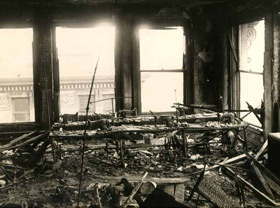NINTH
Part One, Chapter Five (excerpt), page 54
The flames invaded the ninth floor with a swiftness that panicked most of the girls but paralyzed others. Pert, pretty Rose Glantz had been one of the first into the dressing room between the door to the Washington Place stairs and the windows facing the University. In high spirits she began singing a popular song, "Every Little Movement Has a Meaning All Its Own."
Some of her friends joined in and when the group finally emerged from the dressing room, giggling and happy, the flames were breaking the first windows on the ninth floor. Laughter turned to screams.
"We didn't have a chance," Rose recalls. "The people on the eighth floor must have seen the fire start and grow. The people on the tenth floor got the warning over the telephone. But with us on the ninth, all of a sudden the fire was all around. The flames were coming in through many of the windows."
Rose ran to the Washington Place stairway door, tried to open it, and when it stayed locked she stood there, screaming. But as the crowd began to thicken, she pushed forward toward the elevator door. "I saw there was no chance at the elevators. I took my scarf and wrapped it around my head and ran to the freight elevator side. I saw the door to the Greene Street stairs was open so I ran through it and down. The fire was in the hall on the eighth floor. I pulled my scarf tighter around my head and ran right through it. It caught fire. I have a scar on my neck."
She made it down the nine floors, meeting the first group of firemen as she neared the freight entrance at street level. There, firemen stopped her from going into the street as they were also doing in the Washington Place lobby with those who had come down from the eighth floor.
Finally, the firemen "escorted us out. I stood in the doorway of a store across the street and watched. I saw one woman jump and get caught on a hook on the sixth floor. I watched a fireman try to save her. I wasn't hysterical any more; I was just numb."
Leon Stein, The Triangle Fire (New York: A Carroll & Graf/Quicksilver Book, 1962), pp. 54-55.
The Kheel Center would like to thank Mrs. Miriam Stein and Barbara Ismail for granting permission to use selections from the late Leon Stein's book.

